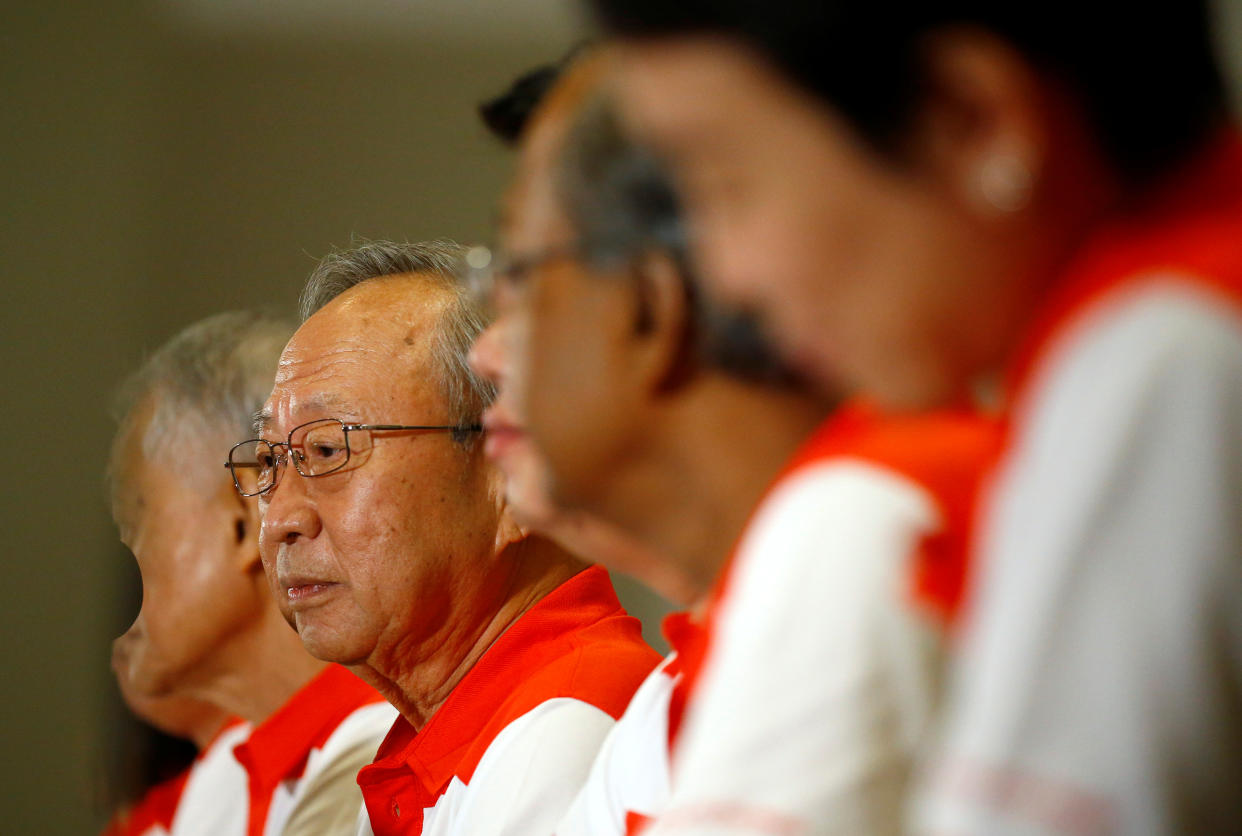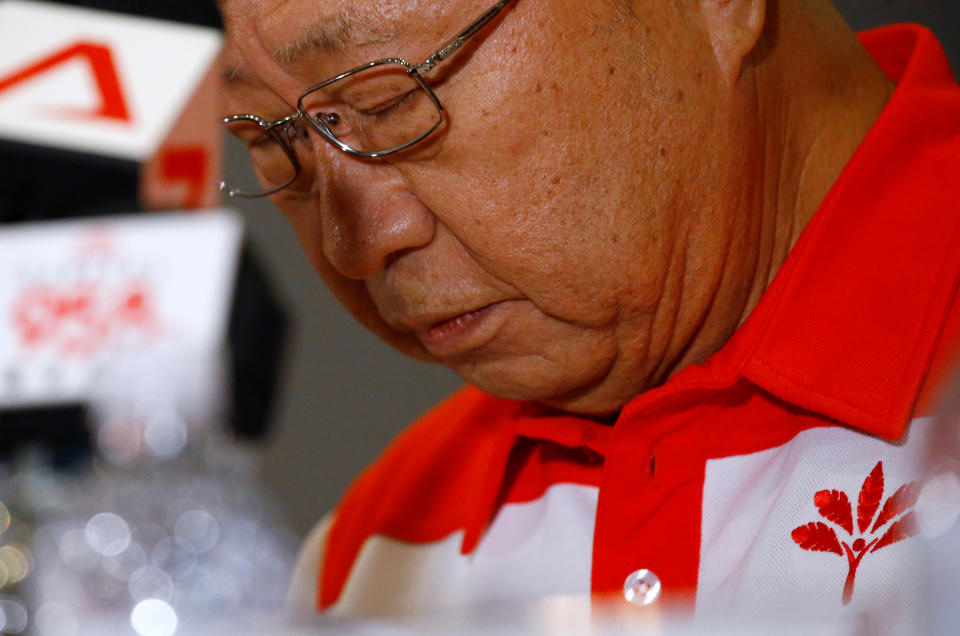Tan Cheng Bock rebuts DPM Heng, cries as he speaks of political conviction

SINGAPORE — Progress Singapore Party (PSP) chief Tan Cheng Bock came out guns blazing against Deputy Prime Minister (DPM) Heng Swee Keat on Saturday (3 August), calling his understanding of transparency “deeply flawed”.
Speaking at a public event at Swissotel Merchant Court to showcase the fledgling party, Dr Tan was responding to Heng’s remarks last month that the parliamentary debate on the long-running Oxley Road saga demonstrated the government’s transparency in key matters of governance.
Addressing a packed ballroom of more than 500 people, the 79-year-old noted of Heng, “His idea of transparency is to have it debated in Parliament, surrounded by an overwhelming majority of his own men, with no right of reply from the other parties (Lee Hsien Yang and Lee Wei Ling, siblings of Prime Minister Lee Hsien Loong).”
He added to applause, “It shows that his very understanding of transparency is deeply flawed.”
A little over a week after the PSP’s official launch, the former presidential candidate also responded to Heng’s comment that an “adversarial” political system would not be good for Singapore. Heng called for a “certain political maturity” where people are encouraged to come out with different ideas to deliver positive outcomes.
Dr Tan alluded to PM Lee’s remarks in 2006 that if there were more opposition members in Parliament, he would have to spend all his time thinking about how to “fix” them instead of focusing on governance.
“So I’m glad to hear that DPM Heng is taking a different approach. Let’s hope he really honours what he says,” said the former People’s Action Party (PAP) Member of Parliament.
‘Ordinary people with the right motives’

Dr Tan got emotional at times during the event, as he admitted that his fear that the PSP might “collapse” without him held him back from forming the party initially.
“But what has since happened is that many men and women came forward to join me. They wanted to build a stronger Singapore. They convinced me to come back, and their presence gave me hope and confidence...to go ahead and start this party,” said the retired medical practitioner.
“I realised I need not fear any more...these are young Singaporeans. They have come to me now...they give me that confidence to do whatever I can within that short space of my life.”
At the party’s official launch on 26 July, Dr Tan had said that the PSP has recruited “a couple of hundred” members, including former People’s Action Party (PAP) cadres.
On Saturday, the PSP chief also repeated his claim that the three pillars of good governance - transparency, independence and accountability - have been eroded in Singapore, saying that there is an “underlying disquiet” in the country, as well as a fear of openly expressing political opinions.
If everything was fine, he asked the audience, “Then why are you sitting in this room?”
What did people think?
Among the gathered crowd was administrator Claire Tan, 40, who was drawn to the event by Dr Tan’s reputation. “He is very well respected. I think he may be the next best candidate, as compared to the PAP candidates,” said Tan, who listed healthcare and Central Provident Fund (CPF) monies among her top concerns as a voter.
“His proposals seem to be working towards making Singapore a better place.”
A 31-year-old civil servant, who only wished to be known as Mr Tan, added that he was looking forward to seeing a new party in Singapore, and agreed that Parliament needs more opposition voices.
Asked what he thought of the PSP’s proposals, he said, “I am neutral. They are still new, so they need time.”
Key players emerge
While the PSP has been criticised in some quarters for being a one-man show, Central Executive Committee members Anthony Lee, 39, and Michelle Lee Juen, 43, appeared to be emerging as key players in the party. They spoke at length and also answered questions from the audience extensively.
Anthony, the assistant secretary-general and a founding member of the PSP, revealed that his father had served Dr Tan as a grassroots member.
He added, “We know that it’s not going to be easy to convince Singaporeans to take a leap of faith with us. But we’re still going to do this, because we only want what’s better for Singapore and Singaporeans.”
Meanwhile, in an address reminiscent of a political rally speech, Michelle mooted the party’s proposal that the voting age in Singapore be lowered to 18, in line with many other countries around the world.
The former Singapore Democratic Party (SDP) member, who stood for the SDP in the Holland-Bukit Timah Group Representation Constituency in 2011, said, “Most countries around the world lowered the voting age to 18 in the 1970s. Malaysia changed their voting age to 18 this year. This is the 21st century, but Singapore politics is still stuck in the 20th century.”
Perennial issues like ministerial pay, the state of the country’s reserves, the need for more opposition parties in Parliament and immigration were also brought up.
Like PSP’s launch last month, the event was scant on specific details of policy proposals.
Besides the proposal to lower the voting age, the PSP advocated, among others, comprehensive primary healthcare for the elderly and a review of the India-Singapore Comprehensive Economic Cooperation Agreement (CECA) that allows Indian professionals in 127 professions to enter and work in the Republic.
Dr Tan ended the event with an appeal to Singaporeans to join him in the PSP, tearing up again as he spoke of Singaporeans’ “moral duty” to improve things for the country and their children.
He also alluded to what the late Lee Kuan Yew told him when he recruited him to the PAP in 1979
Lee said then, “If you don’t come up, don’t blame me if I get second-rate people to take your place.”
Related stories
I 'wholeheartedly support' the Progress Singapore Party: Lee Hsien Yang
'Very loose' opposition alliance is in the works: Tan Cheng Bock
Will Cheng Bock’s appeal to the Merdeka generation work?



